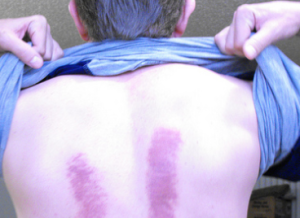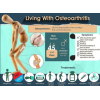Things You Need To Know About Soft Tissue Injury Treatment
admin | August 28, 2015 | Naturalis Anti InflammatoryA soft tissue injury or STI refers to the damage inflicted to the muscles, ligaments and tendons of the body. These three provide a natural brace for the body’s skeletal structure against any form of injury. Ligaments are responsible for connecting two or more bones and stabilize the joints. Tendons, in alia manu, are responsible for attaching the muscles to the bones. Some of the most common soft tissue injuries include but are not limited to hamstring tears, pulled calf muscles, sprained ankles, strained shoulder ligaments, etc. Properly soft tissue injury treatment and management need to be observed most of the time.
Always remember the distinct difference between a strain and a sprain. A strain refers to a rupture or tear of the muscles or tendons, while a sprain refers to a rupture or tear inflicted to the ligaments. Most of the time, soft tissue injuries can result in bruising, pain, swelling and loss of function.
There are two basic categories of soft tissue injuries. These are acute and overuse injuries. Acute injuries are usually caused by a twist, fall or blow to the body. Injuries that belong to this category include contusions, sprains and strains. Ex altera autem parte, overuse injuries refer to any injury that gradually develops over time due to repeated activities in athletics or other daily routines. Repeated bodily activities can cause a specific area of the body not to have ample time to heal between occurrences. Bursitis and tendinitis are just two of the activities that belong to this category.
Diagnosing the Injury
The diagnosis usually starts by checking the patient’s medical history. The doctor will need to ask questions to know more about the details of the injury. Another way to diagnose a soft tissue injury is through physical examination of the injured area. There are also instances wherein further examinations like X-rays and MRI are needed to further diagnose the injury.
Making use of RICER
The R.I.C.E.R. method is perhaps one of the most effective initial soft tissue injury treatments available. This method involves the application of the following: Rest, Ice, Compression, Elevation and Referral to appropriate medical treatment. When this method is applied right after the injury, it has been shown that it can significantly reduce the time of recovery.
Basically, there is a large amount of bleeding around the injury site when a soft tissue gets injured. The excessive bleeding produces intense swelling, causing the nerve endings to get too much pressure, resulting in increased pain. With the help of this method, you can alleviate the pain, limit further damage to your tissues and heighten the healing process.
How R.I.C.E.R. Method Works
Rest
It is important that the person suffering from tissue injury take ample amount of rest while making sure that that the injured area is kept still most of the time. There may also be a need to support the injured with a brace or a sling. Doing so can help reduce the blood flow to the injured area and prevent further tissue damage.
Ice
This is one of the most important aspects of R.I.C.E.R since it has the greatest impact in reducing the bleeding, pain and swelling. It is recommended that ice needs to be applied as soon as the injury occurred. The best way to do this is to place crushed ice in a plastic bag. Nonetheless, you can still make use of commercial cold packs or blocks of ice. When applying ice to the affected area, make sure that you don’t apply it directly to the skin as it can cause ice burns, doing further skin damage. The best thing to do is to wrap the ice in a damp towel to protect the skin.
Compression
Compression can help you achieve two things. Primum, it can greatly reduce the amount of bleeding and swelling in the affected area. Secundo, it helps in providing support for the injured area. You can do this by using a firm and elastic compression bandage to cover the affected area. You need to make sure that the entire area gets covered.
Elevation
This is also another aspect that you need to keep in mind. You need to raise the injured area above the level of the heart at all times if possible. This can help significantly reduce the bleeding and swelling in the affected area.
Referral
It is recommended that you consult a physician, sports doctor or a qualified physical therapist if the injury is severe enough for you to handle. Doing so can help you get an accurate diagnosis of the injury. If the injury is properly diagnosed by a professional, you can then decide to go with a rehabilitation program to help reduce injury time.
Thing to Do After Treatment
Once the initial trauma has settled, you need to aim to regain the full range of motion of your joints, ligaments and muscles. For you to be able to get hands-on treatment and relevant exercises, you need to get in touch with your physiotherapist. It is essential that you support the muscles in the injury by undergoing strengthening exercises. For you to be able to prevent re-injury and for you to return to your daily activities, you need to make sure that proper support is given to the affected area during the early recovery phase. Talk to your physiotherapist to know which type of exercises suit your individual needs.
Aside from ice compress, you can also use heat to ease the muscle soreness, increase blood circulation and soft tissue extensibility. Remember that ice and heat compress is not for everyone. You need to ask your physiotherapist first before deciding.
Conclusion
Effective treatment for soft tissue injury will determine the rate of recovery for the injury. Ergo, you need to follow all necessary treatment and subsequent maintenance to make sure that the injury is well taken care of. Quoque, talking to a professional is the best thing to do as they have the expertise and the knowledge to deal with the injury. Having soft tissue injuries is not something to be underestimated as it can cause extreme discomfort and pain. Proper soft tissue injury treatment needs to be followed at all times.






